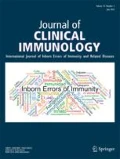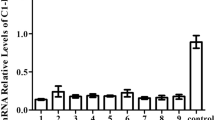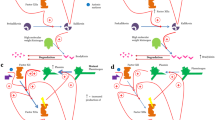Abstract
Hereditary angioedema (HAE) is a heterogeneous genetic disease caused by a deficit in C1 inhibitor (C1-INH) and clinically characterized by sudden events of edema, swelling, and pruritus. Here, we describe the first SERPING1 genotyping in 22 subjects from 4 non-related families, all from southern Colombia. The previously reported heterozygous gene mutations, c.1081C>T (p.Gln361*), c.1396C>G (p.Arg466Gly), c.1029+84G>A, or c.106_107del (p.Ser36Phefs*21), were found in 12 patients. Of note, a single patient clinically characterized as severe HAE type 2 expressed mutations in exon 8 and intron 6, whereas all the others have type 1 HAE and expressed one pathogenic variant. One of the subjects, a 5-year-old girl was discovered to have a pathogenic variant, and she is still asymptomatic. This is the first report focused on HAE genetic analysis in a Colombian population.
Similar content being viewed by others
References
Bernstein JA. HAE update: epidemiology and burden of disease. Allergy Asthma Proc. 2013;34(1):3–6.
Wu MA, Perego F, Zanichelli A, Cicardi M. Angioedema phenotypes: disease expression and classification. Clin Rev Allergy Immunol. 2016;51(2):162–9.
Stoppa-Lyonnet D, Carter PE, Meo T, Tosi M. Clusters of intragenic Alu repeats predispose the human C1 inhibitor locus to deleterious rearrangements. Proc Natl Acad Sci U S A. 1990;87(4):1551–5.
Verpy E, Biasotto M, Brai M, Misiano G, Meo T, Tosi M. Exhaustive mutation scanning by fluorescence-assisted mismatch analysis discloses new genotype-phenotype correlations in angiodema. Am J Hum Genet. 1996;59(2):308–19.
Tosi M. Molecular genetics of C1 inhibitor. Immunobiology. 1998;199(2):358–65.
Skriver K, Radziejewska E, Silbermann JA, Donaldson VH, Bock SC. CpG mutations in the reactive site of human C1 inhibitor. J Biol Chem. 1989;264(6):3066–71.
Germenis AE, Speletas M. Genetics of hereditary angioedema revisited. Clin Rev Allergy Immunol. 2016;51(2):170–82.
Kaplan AP, Joseph K. Pathogenesis of hereditary angioedema: the role of the bradykinin-forming cascade. Immunol Allergy Clin N Am. 2017;37(3):513–25.
Frank MM. Complement disorders and hereditary angioedema. J Allergy Clin Immunol. 2010;125(2 Suppl 2):S262–71.
Sanchez MD, Cuervo J, Rave D, Clemen G, Yepes-Nunez JJ, Ortiz-Reyes B, et al. Hereditary angioedema in Medellin (Colombia): clinical evaluation and quality of life appraisal. Biomedica. 2015;35(3):419–28.
Caballero T, Baeza ML, Cabanas R, Campos A, Cimbollek S, Gomez-Traseira C, et al. Consensus statement on the diagnosis, management, and treatment of angioedema mediated by bradykinin. Part II. Treatment, follow-up, and special situations. J Investig Allergol Clin Immunol. 2011;21(6):422–41. quiz 42-3
Ono H, Kawaguchi H, Ishii N, Nakajima H. A point mutation in exon 7 of the C1-inhibitor gene causing type I hereditary angioedema. Hum Genet. 1996;98(4):452–3.
Gosswein T, Kocot A, Emmert G, Kreuz W, Martinez-Saguer I, Aygoren-Pursun E, et al. Mutational spectrum of the C1INH (SERPING1) gene in patients with hereditary angioedema. Cytogenet Genome Res. 2008;121(3–4):181–8.
Pappalardo E, Caccia S, Suffritti C, Tordai A, Zingale LC, Cicardi M. Mutation screening of C1 inhibitor gene in 108 unrelated families with hereditary angioedema: functional and structural correlates. Mol Immunol. 2008;45(13):3536–44.
Olivares MM, Farfan R, Olmos CE, Gomez C, Sanchez J, Ortega-Lopez MC, et al. Report of Colombian Registry for hereditary angioedema. J Allergy Clin Immunol. 2016;137(2, Supplment):AB248.
Ennis S, Jomary C, Mullins R, Cree A, Chen X, Macleod A, et al. Association between the SERPING1 gene and age-related macular degeneration: a two-stage case-control study. Lancet. 2008;372(9652):1828–34.
Cagini N, Veronez CL, Constantino-Silva RN, Buzolin M, Martin RP, Grumach AS, et al. New mutations in SERPING1 gene of Brazilian patients with hereditary angioedema. Biol Chem. 2016;397(4):337–44.
Lopez-Lera A, Garrido S, Roche O, Lopez-Trascasa M. SERPING1 mutations in 59 families with hereditary angioedema. Mol Immunol. 2011;49(1–2):18–27.
Acknowledgements
We thank all the families, parents, and children who were involved in this study. We also thank Federico Perdomo-Celis (current address: Universidad de Antioquia, Colombia) and Henry Javier Gutierrez-Achury (University of Cambridge, UK) for helping with the registration of the clinical information, and critically reading of the manuscript, respectively.
Funding Information
This study was funded by Shire IIR No. Col00939 and the Universidad Surcolombiana—Neiva. Shire was not involved in the findings reported here in any way.
Author information
Authors and Affiliations
Corresponding authors
Ethics declarations
Conflict of Interest
The authors declare that they have no conflicts of interest
Electronic Supplementary Material
Supplementary Fig 1
Pedigree analysis of Family A (Most of the patients included belong to this Family). Each patient with corroborated mutation is presented and properly codified as shown in Table 1. (JPEG 405 kb)
Rights and permissions
About this article
Cite this article
Rodríguez, J.A., Narváez, C.F. First Analysis of SERPING1 Gene in Patients with Hereditary Angioedema in Colombia Reveals Two Genotypic Variants in a Highly Symptomatic Individual. J Clin Immunol 38, 294–299 (2018). https://doi.org/10.1007/s10875-018-0491-1
Received:
Accepted:
Published:
Issue Date:
DOI: https://doi.org/10.1007/s10875-018-0491-1




